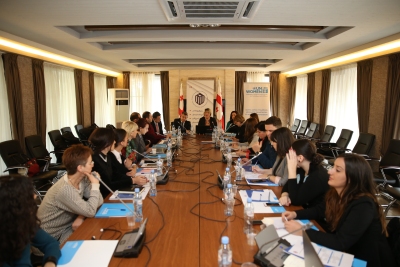UN Women supports security institutions in establishing sex-disaggregated data collection and analysis systems
Date:
To support implementation of Women, Peace and Security agenda priorities in Georgia, UN Women organized a two-day training for the security agencies and central statistical office GEOSTAT on collecting and analyzing sex-disaggregated data.

Representatives of security institutions discuss strategies on improving sex-disaggregated data collection and analysis; Photo: UN Women
“Establishing sex-disaggregated data collection and analysis systems is in line with commitments undertaken by the Government of Georgia under the 2016-2017 National Action Plan on 1325 and contributes directly towards creating an enabling environment for the increased participation of women in the decision-making positions in the security sector,” noted the UN Women Country Representative in Georgia, Erika Kvapilova, in her opening remarks.
While establishing sex-disaggregated data collection and analysis systems in the security institutions is a part of the 2016-2017 National Action Plan (NAP) on UN Security Council resolution 1325 (2000), up until now the topic has remained relatively unexplored. Representing the first step towards tackling the issue, the workshop focused on raising awareness of human resources managers around their respective commitments under the NAP, building capacity of human resources staff on methods and systems around collecting sex-disaggregated data, and using data for policy formulation and tracking progress on gender equality.
“Our current systems already enable collecting sex-disaggregated data on recruitment, training, promotion, et cetera,” reflected Tatia Chikaidze, human resources manager at the Ministry of Internal Affairs. “But very little has been done for systemizing the data and making use of it. The workshop was a good opportunity to start thinking about how we can improve data analysis and, more importantly, to use such analysis for the formulation of our policies.”
In its continuous efforts to promote the Women, Peace and Security agenda and support the implementation of the 2016-2017 NAP on resolution 1325 (2000), UN Women plans to further support security sector institutions in establishing sex-disaggregated data collection and analysis systems via capacity development and the provision of technical assistance.